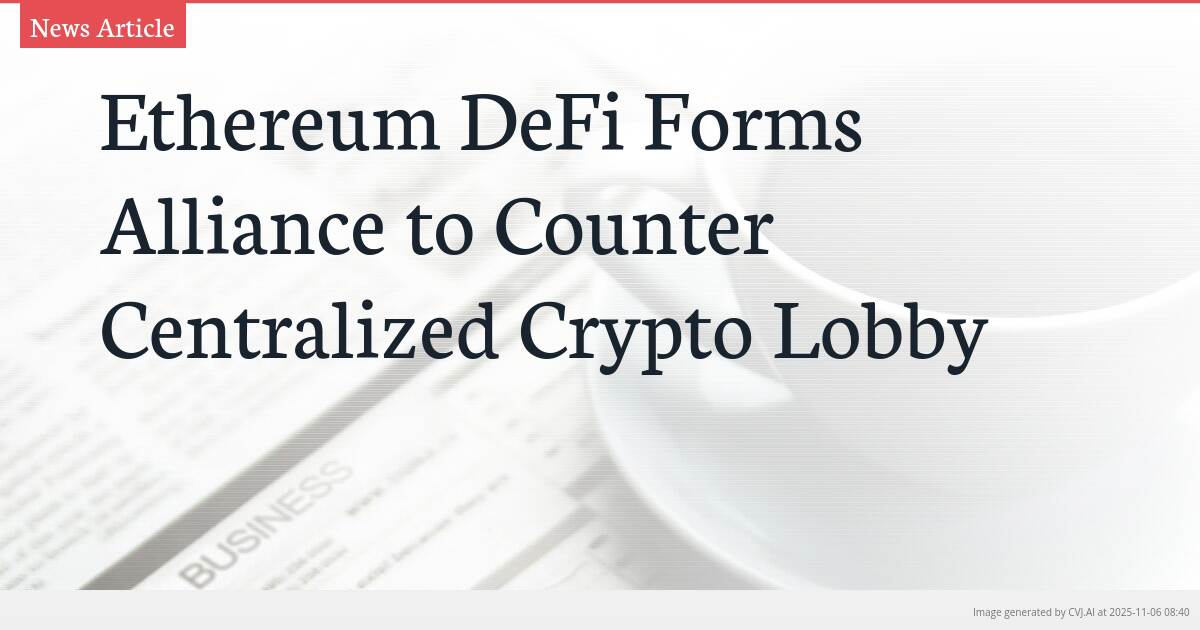This summary text is fully AI-generated and may therefore contain errors or be incomplete.
Introduction
Major Ethereum DeFi protocols have united to challenge the dominant influence of centralized crypto firms in US policymaking. The newly formed Ethereum Protocol Advocacy Alliance aims to coordinate policy efforts and educate lawmakers about blockchain technology. This move addresses concerns that decentralized protocols have been overlooked in regulatory discussions, marking a significant shift in crypto industry representation.
Key Points
- The alliance aims to counter centralized crypto firms' dominant role in shaping US cryptocurrency policy
- EPAA will focus on educating lawmakers about Ethereum's technical foundations and decentralized principles
- The group claims current policy discussions often overlook core blockchain infrastructure due to centralized entities' influence
The Formation of EPAA: A Response to Regulatory Imbalance
The Ethereum Protocol Advocacy Alliance (EPAA) represents a coordinated response from major decentralized finance protocols operating on the Ethereum blockchain. Announced on Tuesday, this coalition emerged from growing concerns among DeFi stakeholders about what they describe as the “outsized influence” that centralized cryptocurrency entities have exerted in US policymaking circles. The alliance brings together key players from the Ethereum ecosystem who believe that the fundamental principles and technologies underlying decentralized infrastructure have been consistently misunderstood or overlooked in regulatory discussions.
The formation of EPAA signals a maturation of the DeFi sector’s approach to regulatory engagement. Rather than operating as individual entities with fragmented messaging, these protocols have recognized the strategic importance of presenting a unified front. This collective action acknowledges that the decentralized nature of their operations requires a different advocacy approach than traditional centralized crypto businesses, which often have more established lobbying operations and clearer corporate structures that regulators can easily engage with.
Addressing the Centralized Influence in Crypto Policy
The EPAA’s primary concern centers on what it perceives as an imbalance in regulatory representation, where centralized crypto exchanges and financial institutions have dominated policy conversations at the expense of decentralized protocol developers and users. This imbalance, according to the alliance, has resulted in policy frameworks that often fail to account for the unique characteristics of decentralized technologies. The group argues that when regulators primarily engage with centralized entities, they risk developing rules that inadvertently undermine or mischaracterize the core innovations of blockchain technology.
The timing of EPAA’s formation coincides with increasing regulatory scrutiny of the cryptocurrency sector in the United States. As lawmakers and regulatory agencies grapple with how to approach digital assets, the alliance aims to ensure that the decentralized perspective receives adequate consideration. The group contends that without proper representation, regulations could be crafted that favor centralized business models while potentially stifling the development of truly decentralized financial systems that operate without intermediaries.
Educational Mission and Policy Coordination Strategy
Central to EPAA’s mission is an educational component focused on helping lawmakers and regulators understand the technical foundations of Ethereum and decentralized protocols. The alliance recognizes that many policymakers lack the technical background to distinguish between centralized crypto services and decentralized infrastructure. This educational gap has often led to regulatory proposals that treat all crypto-related activities similarly, despite fundamental differences in their operational structures and underlying philosophies.
The coordination of policy efforts represents another critical function of the EPAA. By creating a unified advocacy platform, member protocols can develop consistent messaging, share resources, and present coordinated positions on regulatory matters. This approach aims to prevent the fragmentation that has sometimes characterized the crypto industry’s previous engagements with policymakers. The alliance will work to ensure that the distinctive value propositions of decentralized systems—including censorship resistance, transparency, and permissionless access—are properly communicated and considered in legislative and regulatory processes.
This coordinated advocacy effort represents a significant evolution in how decentralized protocols approach regulatory challenges. Rather than reacting to proposed regulations after they’ve been developed, the EPAA aims to engage proactively with policymakers during the formative stages of regulatory frameworks. This forward-looking approach seeks to build relationships with regulatory bodies and legislative offices, positioning the alliance as a reliable resource for technical expertise and industry perspective on decentralized systems.
📎 Read the original article on cointelegraph.com

